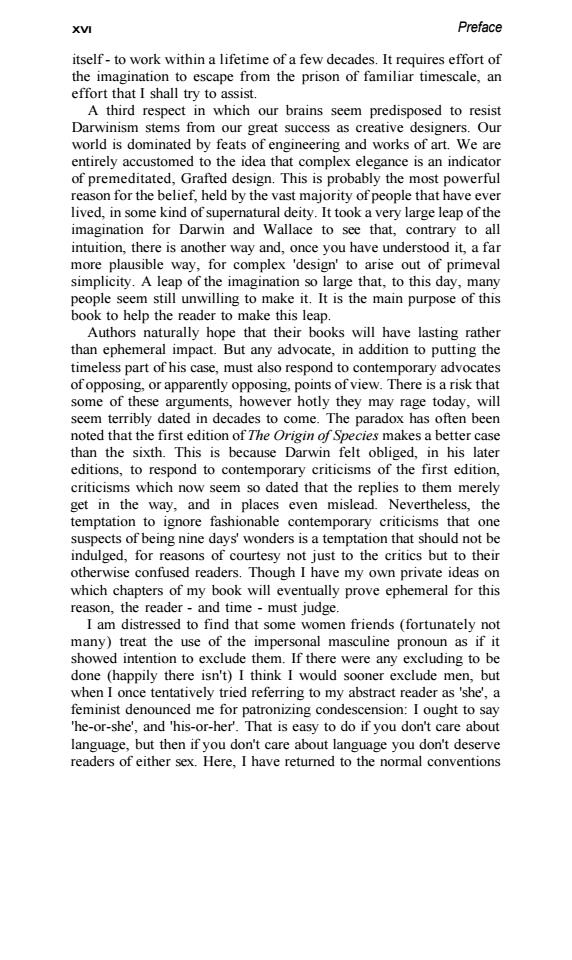正在加载图片...

XVI Preface itself-to work within a lifetime of a few decades.It requires effort of the imagination to escape from the prison of familiar timescale,an effort that I shall try to assist. A third respect in which our brains seem predisposed to resist Darwinism stems from our great success as creative designers.Our world is dominated by feats of engineering and works of art.We are entirely accustomed to the idea that complex elegance is an indicator of premeditated,Grafted design.This is probably the most powerful reason for the belief,held by the vast majority of people that have ever lived,in some kind of supernatural deity.It took a very large leap of the imagination for Darwin and Wallace to see that,contrary to all intuition,there is another way and,once you have understood it,a far more plausible way,for complex 'design'to arise out of primeval simplicity.A leap of the imagination so large that,to this day,many people seem still unwilling to make it.It is the main purpose of this book to help the reader to make this leap. Authors naturally hope that their books will have lasting rather than ephemeral impact.But any advocate,in addition to putting the timeless part of his case,must also respond to contemporary advocates of opposing,or apparently opposing,points of view.There is a risk that some of these arguments,however hotly they may rage today,will seem terribly dated in decades to come.The paradox has often been noted that the first edition of The Origin of Species makes a better case than the sixth.This is because Darwin felt obliged,in his later editions,to respond to contemporary criticisms of the first edition, criticisms which now seem so dated that the replies to them merely get in the way,and in places even mislead.Nevertheless,the temptation to ignore fashionable contemporary criticisms that one suspects of being nine days'wonders is a temptation that should not be indulged,for reasons of courtesy not just to the critics but to their otherwise confused readers.Though I have my own private ideas on which chapters of my book will eventually prove ephemeral for this reason,the reader-and time-must judge. I am distressed to find that some women friends (fortunately not many)treat the use of the impersonal masculine pronoun as if it showed intention to exclude them.If there were any excluding to be done (happily there isn't)I think I would sooner exclude men,but when I once tentatively tried referring to my abstract reader as 'she',a feminist denounced me for patronizing condescension:I ought to say he-or-she',and 'his-or-her'.That is easy to do if you don't care about language,but then if you don't care about language you don't deserve readers of either sex.Here,I have returned to the normal conventionsXVI Preface itself - to work within a lifetime of a few decades. It requires effort of the imagination to escape from the prison of familiar timescale, an effort that I shall try to assist. A third respect in which our brains seem predisposed to resist Darwinism stems from our great success as creative designers. Our world is dominated by feats of engineering and works of art. We are entirely accustomed to the idea that complex elegance is an indicator of premeditated, Grafted design. This is probably the most powerful reason for the belief, held by the vast majority of people that have ever lived, in some kind of supernatural deity. It took a very large leap of the imagination for Darwin and Wallace to see that, contrary to all intuition, there is another way and, once you have understood it, a far more plausible way, for complex 'design' to arise out of primeval simplicity. A leap of the imagination so large that, to this day, many people seem still unwilling to make it. It is the main purpose of this book to help the reader to make this leap. Authors naturally hope that their books will have lasting rather than ephemeral impact. But any advocate, in addition to putting the timeless part of his case, must also respond to contemporary advocates of opposing, or apparently opposing, points of view. There is a risk that some of these arguments, however hotly they may rage today, will seem terribly dated in decades to come. The paradox has often been noted that the first edition of The Origin of Species makes a better case than the sixth. This is because Darwin felt obliged, in his later editions, to respond to contemporary criticisms of the first edition, criticisms which now seem so dated that the replies to them merely get in the way, and in places even mislead. Nevertheless, the temptation to ignore fashionable contemporary criticisms that one suspects of being nine days' wonders is a temptation that should not be indulged, for reasons of courtesy not just to the critics but to their otherwise confused readers. Though I have my own private ideas on which chapters of my book will eventually prove ephemeral for this reason, the reader - and time - must judge. I am distressed to find that some women friends (fortunately not many) treat the use of the impersonal masculine pronoun as if it showed intention to exclude them. If there were any excluding to be done (happily there isn't) I think I would sooner exclude men, but when I once tentatively tried referring to my abstract reader as 'she', a feminist denounced me for patronizing condescension: I ought to say 'he-or-she', and 'his-or-her'. That is easy to do if you don't care about language, but then if you don't care about language you don't deserve readers of either sex. Here, I have returned to the normal conventions